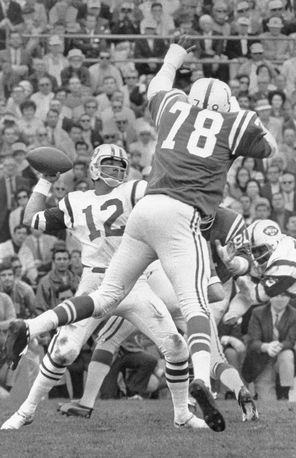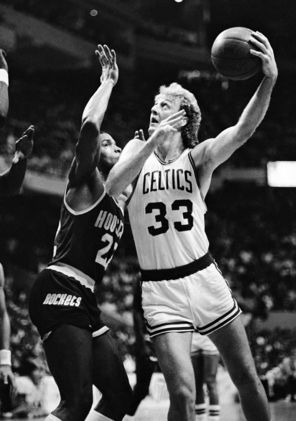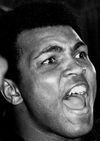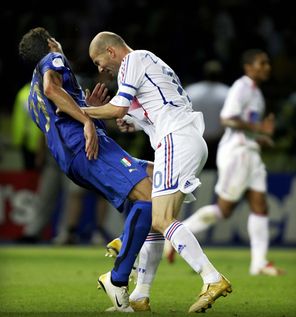Originally published January 31, 2014 at 5:10 PM | Page modified January 31, 2014 at 9:46 PM
Richard Sherman only the latest to talk a good game
Richard Sherman has been criticized for flapping his gums, but the Seahawk is only one of sports’ trash-talkers who could sting like a bee with their comments.
 |
Seattle Times staff reporter
Five great moments in trash-talking
1 Joe Namath made the most famous boast in trash-talking history before Super Bowl III, when he said, “We’re going to win Sunday. I guarantee it.” Namath’s Jets whipped the heavily favored Colts, helping to accelerate the NFL-AFL merger and it was a major factor in the Super Bowl becoming the biggest spectacle in sports.
2 No sport is more linked to trash-talking than boxing, not surprising considering it’s two guys duking it out in a ring. From John L. Sullivan in the late 1800s announcing “I can lick any SOB in the place,” to Bernard “The Executioner” Hopkins providing a “last meal” to his victims at the final prefight news conference, to Mike Tyson babbling, “I want to eat his children!” after knocking out Lou Savarese, fighters talk trash with the best. They are topped by the undisputed king of the genre, Muhammad Ali. His most famous line: “Float like a butterfly, sting like a bee, his hands can’t hit what his eyes can’t see.”
3 Larry Bird is not the first name that comes to mind when thinking of great trash-talkers in history, but he was a stealth boaster. Before the three-point shooting contest at the 1986 All-Star Game, he announced in the locker room: “I’m just looking around to see who’s going to finish second.” And then blew away the field for the title.
4 Maybe the most effective example of trash-talking in sports history was executed by Marco Matterazzi of Italy in the 2006 World Cup final. He so enraged French star Zinedine Zidane with a comment supposedly about his sister that Zidane head-butted Matterazzi. That earned Zidane a red card and an ouster from the game, making him unavailable for a shootout that Italy won.
5 It’s not often you get trash-talking in horse racing, but Rick Dutrow Jr., the trainer of Big Brown, dialed it up prior to the 2008 Belmont, when his horse was going for the Triple Crown. “I feel like it’s actually a foregone conclusion,’’ Dutrow said of a Big Brown victory. “I see the horses in with him and I see our horse, and I expect him to win it.” Alas, Big Brown pulled up late in the race and was eased across the finish line well behind the rest of the Belmont field. The horse declined comment after the race.
Larry Stone

COLUMNISTS
STORIES
![]()
JERSEY CITY, N.J. — I’m going to start with a clown question, bro: Why does trash-talking get us all so riled up?
By us, I’m talking about me and my media brothers and sisters, who have been trying every year for the past 45 to get players at the Super Bowl to replicate Joe Namath’s 1969 guarantee of victory.
Yeah, whether it’s Richard Sherman or someone else, we love the big boast, even if the end game is invariably to tsk-tsk the boaster for having the temerity to speak his mind. When the trash-talker gets his comeuppance, it’s viewed as a triumph of good over evil, an object lesson in the dangers of unsportsmanship. By all means, let’s give him a collective Dikembe Mutombo finger-wag.
To wit: Fred “The Hammer” Williamson, an intimidating defensive player for Kansas City, bragged before the very first Super Bowl that he was going to take out Green Bay receivers Boyd Dowler and Carroll Dale. As it turned out, Williamson was the one knocked cold by Green Bay running back Donny Anderson. According to legend, Packer guard Fuzzy Thurston stood over him and hummed the folk song, “If I Had a Hammer.”
Or how about Thomas “Hollywood” Henderson of the Cowboys taunting Terry Bradshaw before the 1979 Super Bowl by saying he was so dumb “he couldn’t spell cat if you spotted him the ‘c’ and ‘a’.” Bradshaw threw four touchdown passes in a Steelers win, prompting Pittsburgh coach Chuck Noll to say of Henderson, “Empty barrels make the most noise.”
Fans seem to perk up and take notice when someone breaks out of the norm with a burst of bravado. Opposing players certainly do, often later revealing the motivation they took from whatever disrespect was deemed to be aimed at them.
The Super Bowl buildup this year ended the same way it began: With Sherman’s words being parsed and scrutinized. First, it was his outburst aimed at 49ers wide receiver Michael Crabtree right after the Seahawks clinched a trip to New Jersey. Last, it was Sherman’s supposed slight of Peyton Manning by calling his passes “ducks,” even though Sherman’s overriding message was one of respect and admiration for the quarterback’s abilities.
I suspect if Manning has a great day and the Broncos win, several Denver players will point to Sherman’s words — innocent though I firmly believe they were intended to be — as a galvanizing force.
The Seahawks have been there before. In their only other Super Bowl appearance, tight end Jerramy Stevens managed to rile up the Steelers with his comments about Pittsburgh running back Jerome Bettis, who was playing likely his final game in his hometown of Detroit.
“It’s a heartwarming story and all that, but it will be a sad day when he leaves without the trophy,’’ Stevens said during media day.
Those words, the intent of which Stevens said was misconstrued, unleashed a torrent of indignation from the Steelers, expressed most forcefully by linebacker Joey Porter: “I’ve been asleep all week but now I got woke up,” Porter said. “I’ve got my first taste of blood and now I’m thirsty for more ... You look for the guys that say something that aren’t supposed to say nothing, and I feel like he definitely was out of pocket to say what he said. I’m going to make sure he owns up to those words.”
And so it goes, the eternal game within the game that dates to biblical times. The first trash-talker in history might have been David, who said of the giant Goliath in 1 Samuel 17:46: “I will strike you down and cut off your head.”
And then, unlike Stevens, David backed up his words with a well-placed stone from a slingshot. As Dizzy Dean once said after predicting that he and his brother Paul would combine to win 45 games in a season, and then did so, “It ain’t bragging if you can back it up.”
When it comes to trash-talking, we’re really talking about two levels: The chirping in the media (which now can be disseminated directly over social media, without the middle man), and the chirping on the field during the course of the game.
The latter has always been a part of sports, from Babe Ruth calling his shot to Muhammad Ali, after knocking out Sonny Liston for the heavyweight title, famously standing over him and imploring, “Get up and fight, sucka.”
That was a seminal moment in trash-talking history. And it’s no surprise that Sherman watched an Ali documentary when he was 12 and told Sports Illustrated, “He created a persona. He was a leader, an entertainer, he knew how to break people down in the ring. I didn’t really like boxing, but I wanted to be like Ali.’’
It’s no wonder that yapping takes place in a sport like football, where violence is imparted virtually every play.
“Trash-talking is a part of the game,’’ Seahawks defensive back Walter Thurmond said. “It’s a vicious sport out there, tempers are always running kind of hot. Some people think some things should not be allowed, as far as hits. No one ever wants to get hit when they’re not looking. Or if someone gets the better of them, they’re going to talk trash.”
It seems particularly prevalent with wide receivers and defensive backs. That’s understandable when you consider that their day consists mainly of a series of one-on-one battles, played out for the world to see. A dog-eat-dog, no-holds-barred world, at that.
“I definitely understand where Sherm was coming from,’’ said Seahawks receiver Golden Tate, who has been known to be demonstrative himself. “I think we’re really similar in a lot of ways. One, we care about this game so much, and we love playing, and we both have a lot of passion. People don’t understand what goes on out on that field.
“As much as it looks like it’s just football going on, there’s a lot more. You’ve got guys out here that are intentionally trying to give you concussions and blow your knees out, embarrass you, and they’re talking their crap. I understand. You make a great play, and you consider yourself the best in the league, you have the right to talk. It’s a game. Don’t take it off the field. Leave it on the field. I don’t have a problem with that.”
For players, trash-talking is about getting in the heads of opponents, it’s about building up their own confidence, and it’s about releasing the tension of a risky game. For the media, it’s about finding something that pushes the needle. For fans, I suppose, it’s about enhancing their rooting interests.
But now we have on Sunday what has been called the ultimate game (though Cowboys running back Duane Thomas once asked, with unassailable logic, “If it’s the ultimate game, why do they have another one next year?”).
Seahawks wide receiver Doug Baldwin expects the trash-talking to be heavy early, “just because of the hype of the game. But after the first couple plays, it will probably settle down and go back to the normal routine.”
But check back after the walkoff interview.
Larry Stone: 206-464-3146 or lstone@seattletimes.com.











